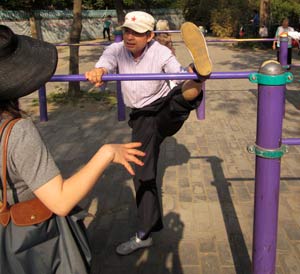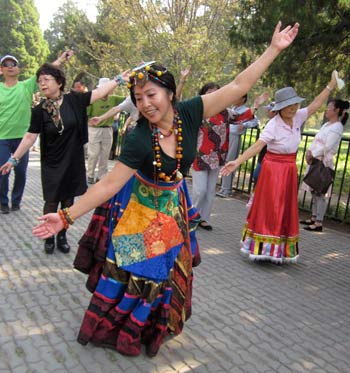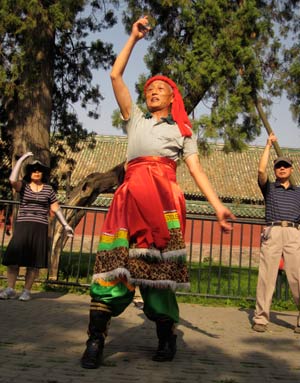UNC senior lecturer Jock Lauterer is on a two-week Fulbright to China to give lectures and lead seminars at three Beijing universities. He is the author of “Community Journalism: Relentlessly Local,” 3rd. Ed, and most recently was the project manager for Prof. Chen Kai’s groundbreaking 2012 book, “An Introduction to Community Newspapers in the U.S.”
Sunday, May 27, 2012
The most surprising thing I saw in China – not that Tiananmen Square or the Great Wall weren’t amazing — was at the Park at the Temple of Heaven where my host took me early this morning to “watch the old people doing funny things.”
I had no idea what she meant by that, but went along because Prof. Karen has been consistent when it comes to surprising me. What I saw was a demonstration of the fitness craze that has enveloped the elderly population of China.
 There, in an immense green space (like a Beijing version of Central Park), we witnessed thousands upon thousands of retirees participating in dozens of different physical activities. Here’s a smattering of what we saw, old folks working out on outdoor gym equipment, stretching, doing calisthenics, playing board games, dancing, doing Ti Chi, playing badminton, engaging in a four-square kicking game like our “hacky-sack” except the average age of the senior athletes looked to mid-60s.
There, in an immense green space (like a Beijing version of Central Park), we witnessed thousands upon thousands of retirees participating in dozens of different physical activities. Here’s a smattering of what we saw, old folks working out on outdoor gym equipment, stretching, doing calisthenics, playing board games, dancing, doing Ti Chi, playing badminton, engaging in a four-square kicking game like our “hacky-sack” except the average age of the senior athletes looked to mid-60s.
I repeat thousands. And it is a daily spontaneous outpouring of therapeutic P.E. that does on, not just here, my host tells me, but in parks in every city across the land every morning, regardless of the weather.
 Well, no wonder I’ve seen no fat old people. If they’re not walking or biking, here working out!
Well, no wonder I’ve seen no fat old people. If they’re not walking or biking, here working out!
For instance, at one open area, an antique portable tape player blared raucous regional folk music for a throng of elderly participants, many in colorful traditional garb, who were engaged in Tibetan folk dances.
Around the square in a clockwise flow, the hundreds of dancers moved in aerobic rhythmic gyrations, smiling, sweating in the morning sun and clearly loving it.
 For the life of me, I found the seniors in the park today to be one of the best examples of camaraderie, togetherness and fellowship I’ve seen in any city setting anywhere in the world. And I found myself thinking: Who says “community” doesn’t exist in China?
For the life of me, I found the seniors in the park today to be one of the best examples of camaraderie, togetherness and fellowship I’ve seen in any city setting anywhere in the world. And I found myself thinking: Who says “community” doesn’t exist in China?
Then an odd thing happened. Suddenly I noticed a handful of Chinese professional-looking photographers taking photos of ME! My host noticed too, warning me, “American journalists are regarded as dangerous here — because you always say bad things about China. That is the opinion of our government.”
It also seemed to be her opinion — and perhaps with good reason. Once, during her year of study in the U.S., a local reporter asked her point-blank if she was happy living in China.
“Why not?” she responded, offended that the American journalist assumed she led a miserable existence in China.
“That’s why,” she explained to me, “I wanted to show you… happy China.”


6 Responses to “In which we see “happy China””
An Old Friend
Jock –
I have read these posts with great interest – because of my own international travels, because my wife is ethnically Chinese and because of another ongoing matter that you may recall but that I will not describe further for fear of it being jeopardized by the mere act of writing this post.
Two items strike me as very strange, and I’m interested in your thoughts –
First, your host, in claiming that she was part of the Tiananmen Protests, says that most of the participants were there for the free food and fun, dismissing the heinous acts of the Chinese government in response to the protests.
Secondly, as an example of “happy China” your host chose to show you Tibetan folk dancers, while the Chinese government forcibly occupies Tibet and vilifies the exiled Dalai Lama. Indeed, possibly while she was showing you this “happy China,” yet another Tibetan, a mother of three, immolated herself in protest against China’s occupation of the region. (http://www.washingtonpost.com/world/asia_pacific/groups-say-tibetan-woman-latest-in-recent-wave-of-self-immolations-to-protest-chinese-rule/2012/05/30/gJQA19412U_story.html)
How likely or unlikely do you reckon it is that your host, as an agent of the Chinese government tasked with guiding an American journalist through the country, was purposefully presenting a whitewashed version of two of the “Three T’s” that are known thorns in the side of the government – Tiananmen, Tibet and Taiwan? And, if this is indeed the case, how does it affect the hopes you and your students share for journalism and other freedoms in China?
Bester Alfred
How I wish I will also be introduced to… HAPPY CHINA… I admire the things mentioned by Jock Lauterer has he noticed another good spot in CHINA.
Ken Ripley
Great comments, Kai. They were very insightful and thought-provoking. I’ve enjoyed reading about Jock’s trip and got a chance to talk to Jock briefly during it. I’m glad the students appreciated my comments he passed on to them. You personally know how much I meant them. Looking forward to talking to you soon. Thank God (yeah, him) for Skype.
admin
Ken, Thanks from Kai and JL. Even though you may not have been in BJ in person, you certainly were there in SPIRIT, old son!
admin
Mr. Joke’s note:
The following is Prof Chen Kai’s thoughtful response to above comment from Old Friend:
I think i failed to make myself understood because of language, because of the huge gap between us. Chinese government is criticized for the dictatorship but that is the result of our long long history. To make a democratic society work, first, the training of citizens is critical. However, if you ask Chinese what is the meaning of “citizen”, just like “community”, few of them know the answer. Can you imagine what the situation will be like if China became a so-called democratic country in 1989? That will be a disaster for its people as well as the world. It is commonly believed that what China needs most is evolution instead of revolution. Take the TIANANMEN SQUARE EVENT for example, if the student leaders demanded then that the existing government turn over the power right away, without any compromise — do you still think it is evolution? There is no denying power is an addictive thing; no one is willing to give it up without any hesitation. If you think in their shoes, you can understand their choice. I never said the students should be killed or it is right for the government to kill its people (actually, in that case, enemies). The demonstrators like me became the hostage of those student leaders. Don’t you think they have the responsibility to protect those naive demonstrators on the square? I believe they already knew earlier that the government would become crazy then, and they would do everything they could to keep the power. What did they do? They just let it happen to get more moral support all over the world.
i was lucky enough to be away that night, otherwise, what a loss for the Chinese community journalism! Actually, i didn’t know what i was doing then. If i saw those tanks, i would flee away instantly.
I don’t think if those student leaders got what they wanted then, they would do better than the current leaders. Absolute power will lead to absolute corruption. What we need is a more sound system, which, we Chinese realize now, will take the country more than several hundred years to establish.
When the Jasmine Revolution occurred last year, i told my students: based on my previous experience, stay away; that is not the best thing for China. What you should do is to shoulder your responsibility for the country bit by bit, you can do lots of small things. In China, especially at critical times, demonstration is not a good choice, which will only make the government more defensive and take more tight control of the media and everything.
Because of language, i still don’t think i expressed myself clearly. I know you tried your best to make me look as normal as possible, however, it still sound ridiculous from the perspective of Americans. But that is what some Chinese think. I should let you know there are various kinds of voices. I will not take back what I said. Your blog doesn’t offend me since that is exactly what I think and keep on saying. But your people’s take-ignorance-for-truth comment about China (that is not the truth, for example. You think life must be miserable in a country without press freedom, if I have the power to direct people to mock the happy scene in the park, what a big potato I am! I do wish that day would come earlier which will be the best news for Chinese community journalism too) upset me which made me feel so vulnerable, I felt like climbing the Mount Everest, a task which can never be finished. i suggest your taking away that blog of TIANANMEN SQUARE in order to avoid more misunderstanding. i know i can’t persuade you, but it is unfair for me to debate such a complex issue in your language. What i can tell you is i am not an exception in holding the view about that event. I think you should know me enough; I am very independent and not a party member and will never be. There is not only black and white (your word) — and there does exist some gray areas.
We Chinese say: Americans always act like they are the world police, telling us what we should or shouldn’t do. We are glad that period is over. There should not be only one dominant voice in the world. What I can’t understand is why you encourage various voices on internal issues, when you wish your voice on the international issue is the only exclusively correct one. As you always say, we can’t cut and paste the US model onto China, so, please give us more time and room to make progress by ourselves bit by bit. If American learns this lesson, the Sino-USA relationship will improve greatly.
–Respectfully submitted
Prof. Chen Kai
admin
Dear Prof Ledford:
Thank you for your thought-provoking and heartfelt comment. As you read for yourself, you touched a nerve. My host professor is concerned that you misunderstood her so thoroughly. Perhaps I too failed to “grok” the layers of her meaning — always in a danger in trans-linguistic communications — and in spite of our best efforts and intentions. But having known and worked with Prof. Chen Kai for three years, I am pretty sure about her true identity, role and motivations. When I first met her in ’09, I tested her candid response by teasing her about being a Chinese spy sent over here to steal all our secrets of small media management. It was ludicrous of course, but I wanted to gauge her response — and her laughter at the mention of it completely defused any latent suspicion. I suppose you would have had to been there to see for yourself. Be that as it may, I want to assure you that I have often reminded myself, “There’s no fool like an old fool” and have watched her carefully. Perhaps I was her minder! How’s that for a switch? In any event, after working together on the book and then this Fulbright lecture series, I can tell you that I trust her completely. While I may not understand her completely, trust is not an issue between us as working colleagues. And finally I regard this entire discussion as a valuable Teachable Moment, demonstrating that while we must “agree to disagree,” is it not a classic example of the power and importance of an open dialogue among civil people?
yr hmbl svt
jock